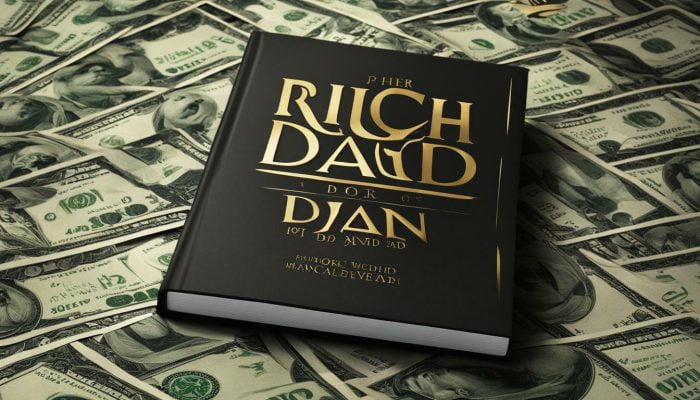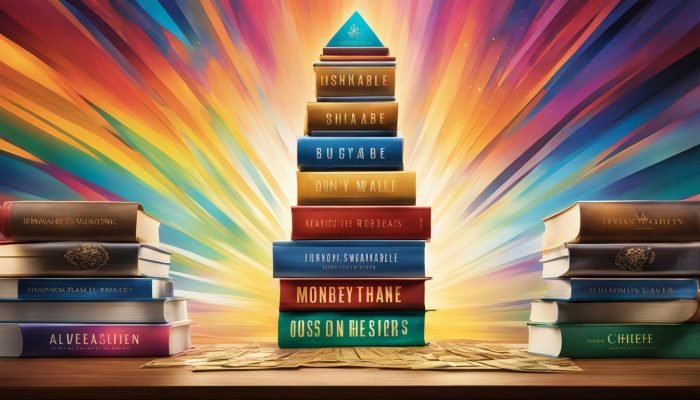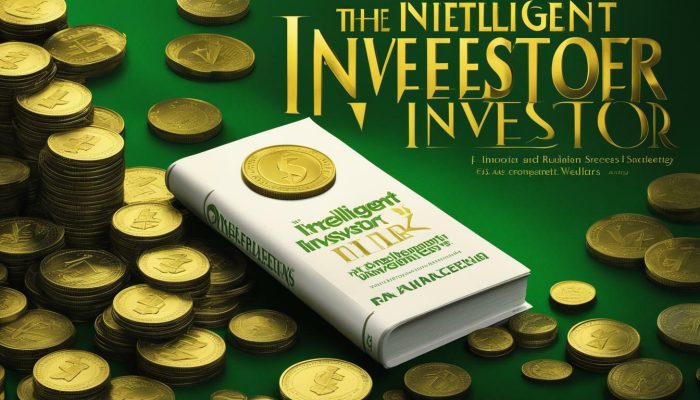Best Get Rich Books of All Time
If you’re looking for the best books on getting rich and discovering the secrets to making money, here are 15 recommendations that can help you on your journey.
In this article, I will unveil the 15 best books on getting rich and reveal the secrets to making money. Whether you’re interested in personal finance, building wealth, or becoming a successful investor, these books have been proven to offer valuable insights. By exploring these timeless resources, you can unlock the strategies and principles needed to achieve financial freedom and build a life of wealth.
Key Takeaways:
- “The Richest Man in Babylon” by George S. Clason is a fundamental book on the principles of wealth-building and financial freedom.
- “Rich Dad Poor Dad” by Robert Kiyosaki challenges traditional thinking about money and offers insights on building wealth.
- “The Millionaire Fastlane” by MJ DeMarco provides unconventional ways to get rich quickly and create sustainable wealth.
- “Money Master the Game” and “Unshakable” by Tony Robbins are valuable resources on investing and building wealth.
- “The Intelligent Investor” by Benjamin Graham teaches the principles of value investing and is Warren Buffet’s favorite investment book.
These books, along with the others mentioned in this article, offer a wealth of knowledge and insights to help you on your journey towards financial success. Whether you’re a beginner or an experienced investor, these books serve as invaluable resources that can empower you to build a life of wealth and freedom.

The Richest Man in Babylon by George S. Clason
One of the best books to start your journey towards financial success is “The Richest Man in Babylon” by George S. Clason, a fundamental guide on wealth-building and financial freedom. This timeless classic offers valuable lessons on managing money, saving, and investing wisely.
In this book, Clason uses relatable stories set in ancient Babylon to provide practical advice that is still applicable in today’s modern world. The principles shared in “The Richest Man in Babylon” can help readers understand the importance of financial literacy and offer insights on how to create wealth and achieve financial freedom.
Whether you’re just starting your journey to financial success or looking to improve your money management skills, “The Richest Man in Babylon” is a must-read book that will empower you with the knowledge and principles needed to build a solid foundation for your financial future.

Table: Key Lessons from “The Richest Man in Babylon”
| Lesson | Description |
|---|---|
| Pay Yourself First | Save a portion of your income before paying your expenses. |
| Invest Wisely | Put your money to work by making informed investment decisions. |
| Control Your Expenses | Avoid overspending and focus on living within your means. |
| Seek Opportunities | Be proactive in finding ways to increase your income and grow your wealth. |
| Learn from Others | Understand the experiences and wisdom of successful individuals to guide your financial decisions. |
By following the principles outlined in “The Richest Man in Babylon,” you can develop the mindset and habits necessary to achieve financial success and build a life of wealth and abundance.
“Rich Dad Poor Dad” by Robert Kiyosaki
In “Rich Dad Poor Dad” by Robert Kiyosaki, you’ll discover a groundbreaking perspective on money and wealth that will change the way you approach your finances. This life-changing book challenges traditional thinking about money and provides invaluable insights on building wealth and achieving financial freedom.
Kiyosaki shares his experiences and lessons learned from his two fathers – his own “poor dad” and the “rich dad” of his best friend. Through their contrasting approaches to money, he explores the importance of financial literacy, the difference between assets and liabilities, and the concept of making money work for you.
The book is filled with practical advice and actionable steps to help you develop a mindset for success and create a path to building wealth. Kiyosaki emphasizes the importance of investing in assets, understanding the power of leverage, and how to develop multiple income streams.
With its relatable stories and powerful insights, “Rich Dad Poor Dad” is a life-changing book that can empower you to take control of your financial future and build a life of abundance and prosperity. As Kiyosaki states, “The single most powerful asset we all have is our mind. If it is trained well, it can create enormous wealth.”
| Key Takeaways from “Rich Dad Poor Dad” |
|---|
| • The importance of financial literacy and understanding how money works. |
| • The difference between assets and liabilities, and the importance of investing in income-generating assets. |
| • The power of leverage and how to use it to your advantage. |
| • The concept of making money work for you, rather than working for money. |
| • The need to develop multiple income streams and create passive income. |
“In “Rich Dad Poor Dad,” Robert Kiyosaki challenges traditional thinking about money and offers powerful insights on building wealth and achieving financial freedom. It’s a life-changing book that can empower you to take control of your financial future.”
Personal Finance Lessons from “Rich Dad Poor Dad”
- Financial Literacy: Kiyosaki emphasizes the importance of financial education and developing a deep understanding of how money works. By increasing your financial literacy, you’ll be better equipped to make informed decisions and build wealth.
- Invest in Assets: Kiyosaki distinguishes between assets and liabilities, highlighting the importance of investing in income-generating assets that appreciate over time. By focusing on acquiring assets, you can build a strong financial foundation.
- Use the Power of Leverage: The book explores the concept of leverage and how it can be used to multiply your results. By intelligently using other people’s time, money, and resources, you can accelerate your wealth-building journey.
- Create Passive Income: Kiyosaki stresses the importance of developing multiple income streams and creating passive income. By generating income that doesn’t require your active involvement, you can achieve financial freedom and enjoy the benefits of your investments.
- Change Your Mindset: One of the key takeaways from “Rich Dad Poor Dad” is the need to shift your mindset from being an employee to thinking like an entrepreneur. By adopting an entrepreneurial mindset, you can unlock opportunities and create the life of abundance you desire.

By delving into the insights and lessons of “Rich Dad Poor Dad” by Robert Kiyosaki, you can gain a fresh perspective on money, build a strong financial foundation, and create a life of wealth and abundance. This groundbreaking book has the potential to transform your financial mindset and empower you to take control of your financial future.
The Millionaire Fastlane by MJ DeMarco
If you’re seeking unconventional paths to wealth and financial independence, “The Millionaire Fastlane” by MJ DeMarco is a book you can’t afford to miss. DeMarco challenges traditional beliefs about getting rich and offers a roadmap to creating sustainable wealth by breaking free from the traditional slow-lane approach.
DeMarco’s book outlines actionable strategies and mindset shifts that can help you accelerate your path to financial success. He emphasizes the importance of leveraging unconventional ways to create wealth quickly and create lasting financial freedom.
In “The Millionaire Fastlane,” DeMarco encourages readers to think like entrepreneurs and seize opportunities to build their own businesses. He emphasizes the power of creating systems that generate passive income and allow individuals to escape the traditional 9-5 grind.
“The Millionaire Fastlane” by MJ DeMarco is a must-read for anyone looking to create unconventional paths to wealth and achieve financial independence. Through his practical advice and unconventional strategies, DeMarco challenges traditional thinking and provides a roadmap to building sustainable wealth and living life on your own terms.

| Key Takeaways from “The Millionaire Fastlane” by MJ DeMarco |
|---|
| Think like an entrepreneur and seek opportunities to create your own business. |
| Focus on unconventional ways to generate wealth quickly. |
| Build systems that generate passive income and allow for financial freedom. |
| Challenge traditional beliefs and embrace a mindset that accelerates your path to financial success. |
If you’re ready to step off the traditional slow-lane and explore unconventional paths to wealth and financial independence, “The Millionaire Fastlane” by MJ DeMarco is a must-read book that will inspire and guide you on your journey.
“Money Master the Game” and “Unshakable” by Tony Robbins
Tony Robbins offers invaluable insights on investing and building wealth in his books “Money Master the Game” and “Unshakable.” These books are valuable resources for anyone looking to enhance their financial knowledge and achieve financial freedom.
“Money Master the Game” is a comprehensive guide to investing, featuring advice from some of the world’s most successful investors. Robbins breaks down complex financial concepts into easy-to-understand language, making it accessible for both beginners and experienced investors. Through interviews with top financial experts, he provides strategies for building a portfolio, minimizing risks, and achieving long-term financial goals.
“Unshakable” focuses on creating a secure financial future by understanding and navigating market volatility. Robbins shares strategies for protecting investments during economic downturns and provides guidance on asset allocation for long-term wealth preservation. This book empowers readers to make informed decisions and take control of their financial destiny.
Both books offer practical tips, actionable advice, and real-world examples that can help readers build wealth and achieve financial independence. Whether you’re a novice investor or a seasoned pro, “Money Master the Game” and “Unshakable” are valuable resources that can guide you on your journey to financial success.

The Intelligent Investor
Considered a cornerstone for any investor, “The Intelligent Investor” by Benjamin Graham provides essential insights into the world of value investing. Graham, known as the father of value investing, pioneered the concept of analyzing the intrinsic value of stocks and focusing on long-term investment strategies. His principles, which have stood the test of time, emphasize the importance of conducting thorough research, investing with a margin of safety, and maintaining discipline in the face of market fluctuations.
Graham’s investment philosophy has not only influenced countless individual investors but also shaped the investment strategies of successful fund managers like Warren Buffet. In fact, Buffet himself has referred to “The Intelligent Investor” as the best investment book ever written. The book teaches investors how to avoid common pitfalls, identify undervalued stocks, and develop a long-term perspective when it comes to wealth creation.

| Key Takeaways from “The Intelligent Investor” |
|---|
| 1. Invest in stocks with a margin of safety, buying at prices below their intrinsic value to protect against market downturns. |
| 2. Diversify your portfolio to reduce risk and maximize potential returns. |
| 3. Take a long-term approach to investing, focusing on the fundamentals of the companies you invest in rather than short-term market fluctuations. |
| 4. Conduct thorough research and analysis before making investment decisions, using quantitative and qualitative factors. |
| 5. Be patient and disciplined, avoiding emotional reactions to market volatility. |
With its timeless wisdom and practical advice, “The Intelligent Investor” serves as a guide for investors seeking to build a solid foundation in value investing. By following Graham’s principles, investors can navigate the complex world of finance with confidence and increase their chances of achieving long-term financial success.
Principles by Ray Dalio
In “Principles” by Ray Dalio, you’ll gain access to the principles that guided a billionaire investor to extraordinary success. Dalio shares his core ideas on money, success, and decision-making, providing readers with invaluable insights into the world of finance and business.
With an emphasis on radical truth and transparency, Dalio’s principles challenge conventional thinking and encourage individuals to embrace a more open-minded approach to problem-solving and decision-making. By implementing these principles, readers can navigate the complexities of the financial world and unlock their potential for financial success.

In addition to his own principles, Dalio also shares lessons learned from his experiences as a billionaire investor, providing readers with real-life examples that illustrate the power of his principles in action. Through insightful anecdotes and practical advice, Dalio offers a roadmap to achieving success and financial prosperity.
Key Takeaways from “Principles” by Ray Dalio
- Embrace radical truth and radical transparency to foster a culture of open communication and promote better decision-making.
- Learn from failures and mistakes, treating them as valuable opportunities for growth and improvement.
- Understand the role of principles in guiding decision-making and problem-solving, allowing for more effective and efficient outcomes.
- Constantly iterate and evolve by seeking feedback and adapting to changing circumstances.
The principles outlined in Ray Dalio’s book have the potential to transform the way you approach finance, business, and life. By incorporating these principles into your own decision-making process, you can set yourself up for greater success and achieve your financial goals.
| Book | Author | Key Ideas |
|---|---|---|
| “Principles” | Ray Dalio | – Embrace radical truth and transparency |
| – Learn from failures and mistakes | ||
| – Understand the role of principles in decision-making | ||
| – Constantly iterate and evolve |
The 4 Hour Work Week by Tim Ferriss
Discover how to escape the traditional work week and create a life of freedom with The 4 Hour Work Week by Tim Ferriss. This groundbreaking book revolutionizes the way we think about work and building a business. Ferriss shares strategies for maximizing productivity, outsourcing tasks, and automating processes, allowing you to work smarter instead of harder.
One of the key principles of The 4 Hour Work Week is leveraging the power of the internet to create passive income streams and achieve financial independence. Ferriss provides step-by-step instructions on how to build an online business, optimize your time, and embrace a location-independent lifestyle. This book challenges conventional wisdom and encourages readers to question the societal norms that bind them to a traditional workweek.

Takeaways from The 4 Hour Work Week:
- Learn how to prioritize your tasks and eliminate time-wasting activities. Focus on what truly matters to achieve maximum results.
- Outsource repetitive and low-value tasks to free up your time to focus on high-impact activities.
- Implement automation and systems to streamline your business processes and maximize efficiency.
- Embrace the concept of mini-retirements and design your life to have more freedom and flexibility.
By following Ferriss’s strategies and principles outlined in The 4 Hour Work Week, you can create a business and lifestyle that allows you to work on your own terms and enjoy a life of freedom and fulfillment.
| Key Details | |
|---|---|
| Title: | The 4 Hour Work Week |
| Author: | Tim Ferriss |
| Main Focus: | Work-life balance and entrepreneurship |
| Key Themes: | Time management, outsourcing, automation, online business |
Zero to One
“Zero to One” by Peter Thiel offers invaluable insights on innovation and building successful start-ups. Thiel, a renowned entrepreneur and investor, shares his unique perspectives on how to create something new and valuable in an increasingly competitive world. The book challenges conventional wisdom and provides a roadmap for entrepreneurs looking to build game-changing companies.
Thiel emphasizes the importance of creating monopolies, as they allow businesses to capture significant value and maintain a strong market position. He encourages entrepreneurs to focus on creating breakthrough innovations rather than simply copying existing ideas. By identifying untapped markets and developing proprietary technology, entrepreneurs can achieve a “zero to one” transformation, creating something entirely new that has the potential to change the world.
Throughout the book, Thiel provides practical advice on various aspects of building a successful start-up, including hiring the right team, creating a strong company culture, and navigating the challenges of fundraising and scaling. He shares personal anecdotes and case studies to illustrate his points, offering valuable lessons from his own experiences in co-founding PayPal and investing in companies like Facebook.
The next Mark Zuckerberg won’t start a social network, the next Elon Musk won’t start an electric car company. If you are copying these guys, you aren’t learning from them.” – Peter Thiel

Thiel’s book is a must-read for aspiring entrepreneurs and anyone interested in innovation and building the future. By challenging conventional thinking and providing actionable insights, “Zero to One” offers a fresh perspective on entrepreneurship that can inspire and guide individuals on their journey to creating successful start-ups.
| Key Takeaways from “Zero to One” by Peter Thiel: |
|---|
| Create something new and valuable rather than copying existing ideas. |
| Focus on creating breakthrough innovations and monopolies. |
| Build the right team and company culture. |
| Navigate the challenges of fundraising and scaling. |
The Parable of the Pipeline by Burke Hedges
Learn the importance of changing your focus and building a business that generates passive income with “The Parable of the Pipeline” by Burke Hedges. This short yet powerful book teaches the concept of shifting from a linear income mindset to a passive income mindset, ultimately leading to financial freedom.
Hedges uses a parable to illustrate the power of creating a system that works for you. The book emphasizes the importance of building assets and leveraging them to create a steady stream of income. By changing your focus from trading time for money to building a pipeline that generates passive income, you can break free from the limitations of traditional employment and create a life of abundance.
“The Parable of the Pipeline” highlights the fundamental principle of generating wealth through residual income. Hedges teaches readers how to transition from being the laborers to becoming the owners of the pipeline, allowing money to flow effortlessly into their lives. By understanding and implementing the lessons from this book, you can set yourself on the path to financial independence and a future where money works for you.
With its simple yet profound message, “The Parable of the Pipeline” offers a powerful perspective on wealth creation. By embracing the principles outlined in this book, you can build a business that generates passive income and create a life of financial abundance.
Table: Key Takeaways from “The Parable of the Pipeline”
| Key Takeaways |
|---|
| Shift from a linear income mindset to a passive income mindset |
| Create a system that generates passive income |
| Build assets and leverage them to generate income |
| Break free from the limitations of traditional employment |
| Embrace the concept of residual income |
By applying the principles presented in “The Parable of the Pipeline,” you can transform your financial future and create a business that provides ongoing passive income. Start building your own pipeline of wealth today!

Develop essential communication skills and learn to build strong relationships with “How to Win Friends and Influence People” by Dale Carnegie. This classic book is a timeless guide to interpersonal effectiveness in both business and personal settings. Through real-life examples and practical advice, Carnegie highlights the importance of empathy, active listening, and genuine interest in others.
The book emphasizes the power of positive communication and provides strategies for winning people over, resolving conflicts, and gaining influence. Carnegie’s principles can be applied to various aspects of life, including networking, sales, leadership, and personal relationships. By following Carnegie’s teachings, readers can enhance their communication skills, build lasting connections, and achieve greater success in their endeavors.
Table 1: Key Takeaways from “How to Win Friends and Influence People”
| Principles | Description |
|---|---|
| 1. Be genuinely interested in others | Show sincere curiosity about people and their experiences. Listen actively and ask thoughtful questions. |
| 2. Remember people’s names and use them | Using someone’s name creates a personal connection and shows respect. It also helps you remember them. |
| 3. Seek to understand before being understood | Practice empathy and try to see situations from others’ perspectives. Show understanding and compassion. |
| 4. Give sincere appreciation and praise | Recognize and acknowledge the efforts of others. Offer genuine compliments and show gratitude. |
| 5. Avoid criticism and focus on solutions | Instead of pointing out flaws, provide constructive feedback and suggest alternatives or improvements. |
By implementing these principles, readers can build trust, inspire others, and foster positive relationships. “How to Win Friends and Influence People” remains a vital resource for anyone seeking to improve their communication skills and effectively navigate social interactions in both business and personal contexts.

Avoid common mistakes and learn the key principles of building a successful business with “The E-Myth Revisited” by Michael E. Gerber. This book provides valuable insights into the common pitfalls that new entrepreneurs often encounter. Gerber emphasizes the importance of working on your business rather than in your business, and he offers actionable strategies for creating systems and processes that can lead to long-term success.
Gerber’s book explores the myth that most small businesses are started by entrepreneurs when, in fact, they are started by technicians who have little knowledge of business management. He argues that in order to build a successful business, entrepreneurs must develop the mindset of a business owner and focus on creating scalable systems.
One of the key takeaways from “The E-Myth Revisited” is the concept of working on your business, not just in it. Gerber encourages entrepreneurs to step back from day-to-day tasks and invest time in developing systems that allow the business to run efficiently and effectively. By leveraging technology and creating standardized processes, entrepreneurs can free up their time to focus on strategic growth.
Table 1: Common Mistakes in Building a Business
| Mistake | Explanation |
|---|---|
| Lack of Systems | Many entrepreneurs fail to create systems and processes that can be replicated and scaled, leading to chaos and inefficiency. |
| Micromanagement | Instead of delegating tasks and trusting employees, some entrepreneurs try to do everything themselves, limiting the growth potential of the business. |
| Failure to Innovate | Successful businesses continuously innovate and adapt to market changes. Entrepreneurs who fail to do so risk becoming irrelevant. |
| Ignoring Marketing and Sales | Many entrepreneurs focus solely on their product or service, neglecting the importance of marketing and sales in driving business growth. |
By understanding and avoiding these common mistakes, entrepreneurs can position themselves for success. “The E-Myth Revisited” provides practical advice and real-world examples that entrepreneurs can apply to their own businesses, regardless of industry or size.

In conclusion, “The E-Myth Revisited” by Michael E. Gerber is a must-read book for anyone looking to build a successful business. By learning from the common mistakes made by entrepreneurs and focusing on the key principles outlined in the book, aspiring business owners can increase their chances of achieving long-term success.
FAQ
What are the best books on getting rich and discovering the secrets to making money?
Here are 15 recommendations:
What is “The Richest Man in Babylon” by George S. Clason about?
“The Richest Man in Babylon” is a fundamental book on the principles of wealth-building and financial freedom.
What can I learn from “Rich Dad Poor Dad” by Robert Kiyosaki?
“Rich Dad Poor Dad” challenges traditional thinking about money and offers insights on building wealth.
What makes “The Millionaire Fastlane” by MJ DeMarco a must-read?
“The Millionaire Fastlane” offers unconventional ways to get rich quickly and create sustainable wealth.
Are there any valuable resources on investing and building wealth?
Yes, “Money Master the Game” and “Unshakable” by Tony Robbins provide comprehensive guidance on these topics.
What can I learn from “The Intelligent Investor” by Benjamin Graham?
“The Intelligent Investor” teaches the principles of value investing and is Warren Buffet’s favorite investment book.
“Principles” offers insights on money and success from billionaire investor Ray Dalio.
How does “The 4 Hour Work Week” by Tim Ferriss revolutionize the way we think about work?
“The 4 Hour Work Week” shares strategies for escaping the 9-5 grind and creating a lifestyle of freedom and fulfillment.
What does “Zero to One” by Peter Thiel explore?
“Zero to One” explores the possibilities of building the future and creating a successful start-up.
What is the message behind “The Parable of the Pipeline” by Burke Hedges?
“The Parable of the Pipeline” emphasizes the importance of changing your focus and building a business to generate passive income.
How can “How to Win Friends and Influence People” by Dale Carnegie help in business and life?
This classic book teaches communication skills that can help you get ahead in both business and life.
What can I learn from “The E-Myth Revisited” by Michael E. Gerber?
“The E-Myth Revisited” exposes common mistakes new entrepreneurs make and offers guidance on building a successful business.
What is the conclusion about the 15 best get rich books of all time?
These books offer a wealth of knowledge and insights to help you on your journey towards financial success.
Conclusion: Best Get Rich Books of All Time
These 15 best get rich books of all time are indispensable resources for anyone looking to achieve financial success and build a life of wealth and freedom. Whether you’re interested in personal finance, building wealth, or becoming a successful entrepreneur, these books offer valuable insights and strategies to help you on your journey.
From foundational books like “The Richest Man in Babylon” by George S. Clason and “Rich Dad Poor Dad” by Robert Kiyosaki, to unconventional guides like “The Millionaire Fastlane” by MJ DeMarco, each book tackles different aspects of wealth-building and offers unique perspectives on achieving financial freedom.
Additionally, books like “Money Master the Game” and “Unshakable” by Tony Robbins provide comprehensive guidance on investing and creating a secure financial future. Meanwhile, “The Intelligent Investor” by Benjamin Graham and “Principles” by Ray Dalio delve into the principles behind successful investing and building wealth.
Furthermore, books such as “The 4 Hour Work Week” by Tim Ferriss and “Zero to One” by Peter Thiel revolutionize the way we think about work, entrepreneurship, and building businesses. These resources offer strategies to escape the traditional 9-5 grind and create a lifestyle that prioritizes freedom and fulfillment.
Finally, books like “The Parable of the Pipeline” by Burke Hedges, “How to Win Friends and Influence People” by Dale Carnegie, and “The E-Myth Revisited” by Michael E. Gerber provide valuable insights on changing focus, building relationships, and avoiding common mistakes when building a successful business.
With these 15 diverse and impactful books, you now have a wealth of knowledge and wisdom at your fingertips. So, dive into these resources and unlock the secrets to financial success, as you embark on your journey to wealth and freedom.